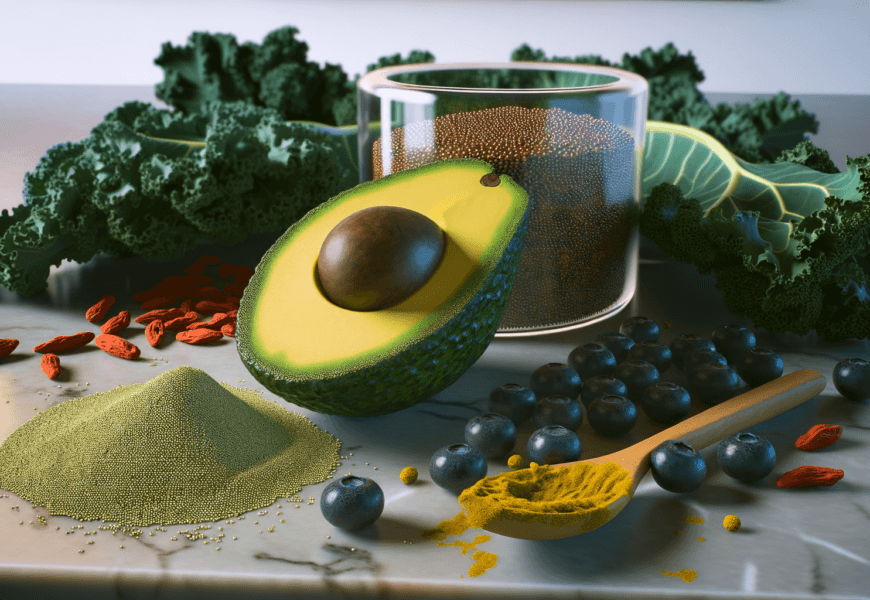Is There Really Such Thing as a Superfood? Exploring the Science Behind Superfood Claims
In recent years, the term "superfood" has become a buzzword in the health and wellness community. From chia seeds to kale, these nutrient-rich foods are celebrated for their supposed health benefits. But is there really such a thing as a superfood, or is it just a marketing gimmick? In this blog post, we delve into the superfood science to uncover the truth behind these claims, exploring what makes a food "super" and the evidence supporting such assertions.
Understanding the Concept of Superfoods
The concept of superfoods is not new. For centuries, certain foods have been revered for their health benefits and unique properties. However, the term "superfood" itself is relatively modern, gaining popularity in the 21st century as a way to promote foods believed to have exceptional health benefits.
Definition of Superfoods
Superfoods are generally defined as foods that are rich in nutrients and believed to confer health benefits beyond those of ordinary foods. These foods are often high in antioxidants, vitamins, and minerals, and are purported to improve health outcomes, boost energy, and even prevent diseases. However, it is important to note that there is no official scientific definition or classification of superfoods.
The Marketing Influence
The rise of superfoods can be attributed, in part, to savvy marketing strategies. The term "superfood" is often used in advertising to highlight the supposed health benefits of a product, influencing consumer choices. While these foods can be part of a healthy diet, the marketing may exaggerate their benefits, leading to misconceptions about their true impact on health.
The Science Behind Superfoods: What Does Research Say?
To evaluate whether superfoods live up to their claims, it's crucial to examine the scientific evidence behind them. Here, we explore superfood science, looking at some popular superfoods and the research supporting their health benefits.
Antioxidant Powerhouses: Berries and Their Benefits
Berries, including blueberries, strawberries, and acai, are often labeled as superfoods due to their high antioxidant content. Antioxidants are compounds that help neutralize free radicals, potentially reducing oxidative stress and lowering the risk of chronic diseases.
Blueberries
Blueberries are celebrated for their high levels of anthocyanins, which are antioxidants linked to various health benefits. Research suggests that blueberries may improve brain health, reduce the risk of heart disease, and aid in managing blood sugar levels. A study published in the "Journal of Agricultural and Food Chemistry" found that blueberry consumption improved memory and cognitive function in older adults.
Acai Berries
Acai berries, native to the Amazon rainforest, are another antioxidant-rich superfood. They are high in anthocyanins and flavonoids, which may support heart health and reduce inflammation. While acai berries have gained popularity for their potential anti-aging effects, more research is needed to confirm these benefits.
Nutrient-Dense Greens: Kale and Spinach
Leafy greens like kale and spinach are often praised for their nutrient density. These greens are rich in vitamins, minerals, and fiber, making them excellent additions to a balanced diet.
Kale
Kale is packed with vitamins A, C, and K, as well as calcium and iron. It also contains antioxidants like quercetin and kaempferol. Studies have shown that kale can help lower cholesterol levels and support heart health. However, it's important to consume kale in moderation, as excessive intake may interfere with thyroid function due to its goitrogen content.
Spinach
Spinach is another leafy green lauded for its nutritional profile. It is a great source of iron, magnesium, and folate. The lutein and zeaxanthin in spinach are beneficial for eye health, potentially reducing the risk of cataracts and macular degeneration. Research also suggests that spinach may help regulate blood pressure and improve overall cardiovascular health.
Seeds for Health: Chia and Flaxseeds
Seeds like chia and flaxseeds are often included in superfood lists due to their high fiber and omega-3 fatty acid content. These seeds are associated with improved digestive health and reduced inflammation.
Chia Seeds
Chia seeds are rich in omega-3 fatty acids, fiber, and protein. They can help promote satiety, making them a popular choice for weight management. Studies have shown that chia seeds may help lower blood sugar levels and improve heart health by reducing triglycerides and cholesterol.
Flaxseeds
Flaxseeds are another excellent source of omega-3s, as well as lignans, which have antioxidant properties. Research indicates that flaxseeds may help reduce cancer risk, particularly breast cancer, due to their hormone-balancing effects. Additionally, flaxseeds can aid in lowering blood pressure and improving cholesterol levels.
The Limitations of Superfood Science
While there is promising research supporting the health benefits of many superfoods, it's important to acknowledge the limitations of superfood science. The following sections highlight some of the challenges in this field.
Lack of Standardization
One of the major challenges in superfood science is the lack of standardization in defining and classifying superfoods. Without a clear scientific definition, the term is often used indiscriminately, leading to confusion among consumers.
Exaggerated Health Claims
Marketing often exaggerates the health benefits of superfoods, which can mislead consumers. While these foods can contribute to a healthy diet, they are not cure-alls, and their benefits should not be overstated.
The Importance of a Balanced Diet
A diet focusing solely on superfoods can overlook the importance of variety and balance. No single food, even a superfood, can provide all the necessary nutrients for optimal health. It is essential to consume a diverse range of foods to meet nutritional needs.
Do Superfoods Have a Place in a Healthy Diet?
Given the benefits and limitations of superfoods, it's important to consider their role within the context of an overall healthy diet. Here, we explore how superfoods can fit into a balanced eating plan.
Incorporating Superfoods Wisely
Superfoods can be a valuable part of a healthy diet when consumed in moderation and as part of a varied diet. Incorporating a variety of superfoods, alongside other nutrient-dense foods, can help ensure a well-rounded intake of vitamins, minerals, and antioxidants.
The Role of Whole Foods
Focusing on whole foods, rather than isolated superfoods, is key to achieving optimal health. Whole foods provide a range of nutrients that work synergistically to support health. Emphasizing whole grains, fruits, vegetables, lean proteins, and healthy fats can help create a balanced diet.
The Importance of Personalization
Nutrition is not one-size-fits-all. It's important to consider individual needs, preferences, and health conditions when incorporating superfoods into the diet. Consulting with a healthcare professional or registered dietitian can help tailor dietary choices to individual goals and requirements.
Conclusion: The Verdict on Superfoods
In conclusion, while there is scientific evidence supporting the health benefits of many foods labeled as superfoods, the term itself is often more marketing than science. Superfood science highlights the potential of these foods to contribute positively to health, but it's crucial to approach them with a balanced perspective.
Superfoods can be a valuable addition to a healthy diet, but they should not overshadow the importance of variety and balance. A diet rich in diverse, whole foods, personalized to individual needs, is the best approach to achieving and maintaining optimal health.
Ultimately, embracing the principles of superfood science means understanding the role these foods play in the broader context of nutrition and wellness. By doing so, we can make informed choices that support our health and well-being.










